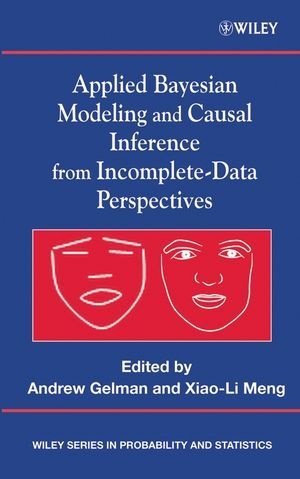Read more
Informationen zum Autor Andrew Gelman is Professor of Statistics and Professor of Political Science at Columbia University. He has published over 150 articles in statistical theory, methods, and computation, and in applications areas including decision analysis, survey sampling, political science, public health, and policy. His other books are Bayesian Data Analysis (1995, second edition 2003) and Teaching Statistics: A Bag of Tricks (2002). Klappentext This book brings together a collection of articles on statistical methods relating to missing data analysis, including multiple imputation, propensity scores, instrumental variables, and Bayesian inference. Covering new research topics and real-world examples which do not feature in many standard texts. The book is dedicated to Professor Don Rubin (Harvard). Don Rubin has made fundamental contributions to the study of missing data.Key features of the book include:* Comprehensive coverage of an imporant area for both research and applications.* Adopts a pragmatic approach to describing a wide range of intermediate and advanced statistical techniques.* Covers key topics such as multiple imputation, propensity scores, instrumental variables and Bayesian inference.* Includes a number of applications from the social and health sciences.* Edited and authored by highly respected researchers in the area. Zusammenfassung This book brings together a collection of articles on statistical methods relating to missing data analysis, including multiple imputation, propensity scores, instrumental variables, and Bayesian inference. Covering new research topics and real-world examples which do not feature in many standard texts. The book is dedicated to Professor Don Rubin (Harvard). Don Rubin has made fundamental contributions to the study of missing data.Key features of the book include:* Comprehensive coverage of an imporant area for both research and applications.* Adopts a pragmatic approach to describing a wide range of intermediate and advanced statistical techniques.* Covers key topics such as multiple imputation, propensity scores, instrumental variables and Bayesian inference.* Includes a number of applications from the social and health sciences.* Edited and authored by highly respected researchers in the area. Inhaltsverzeichnis Preface. I Casual inference and observational studies. 1 An overview of methods for causal inference from observational studies, by Sander Greenland. 1.1 Introduction. 1.2 Approaches based on causal models. 1.3 Canonical inference. 1.4 Methodologic modeling. 1.5 Conclusion. 2 Matching in observational studies, by Paul R. Rosenbaum. 2.1 The role of matching in observational studies. 2.2 Why match? 2.3 Two key issues: balance and structure. 2.4 Additional issues. 3 Estimating causal effects in nonexperimental studies, by Rajeev Dehejia. 3.1 Introduction. 3.2 Identifying and estimating the average treatment effect. 3.3 The NSWdata. 3.4 Propensity score estimates. 3.5 Conclusions. 4 Medication cost sharing and drug spending in Medicare, by Alyce S. Adams. 4.1 Methods. 4.2 Results. 4.3 Study limitations. 4.4 Conclusions and policy implications. 5 A comparison of experimental and observational data analyses, by Jennifer L. Hill, Jerome P. Reiter, and Elaine L. Zanutto. 5.1 Experimental sample. 5.2 Constructed observational study. 5.3 Concluding remarks. 6 Fixing broken experiments using the propensity score, by Bruce Sacerdote. 6.1 Introduction. 6.2 The lottery data. 6.3 Estimating the propensity scores. 6.4 Results. 6.5 Concluding remarks. 7 The propensity score with continuous treatments, by Keisuke Hirano and Guido W. Imbens.

